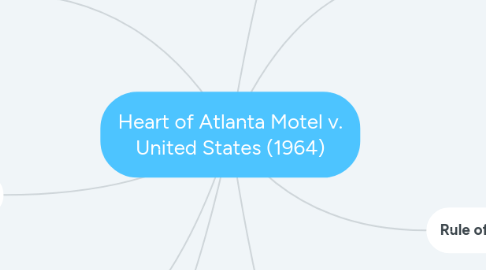
1. Conclusion
1.1. The US Supreme court upheld the decision that the Civil Rights Act of 1964 is constitutional, as Congress has the power to regulate interstate commerce, including at the local level if there might be a substantial and harmful effect on commerce. The Heart of Atlanta Motel must not discriminate who may stay at the hotel based on race.
2. Impact
2.1. US vs Lopez (1995)
2.1.1. The defendant was convicted of carrying a firearm in a school zone, which violated the Gun-Free School Zone act.
2.1.1.1. The Court of Appeals of 5th District reversed the decision, so the government appealed to the Supreme Court.
2.1.1.1.1. The Supreme Court determined this was out of the realm of the Commerce Clause since the possession of the gun in a school zone did not affect interstate commerce. The Heart of Atlanta Motel v US was referrenced in this US vs Lopez case.
2.2. Katzenbach v. McClung (1964)
2.2.1. Ollie's Barbecue discriminated against its customers based on race.
2.2.1.1. Ultimately, the Supreme Court used the Commerce Clause to determine that the actions of the restaurant were illegal because the restaurant purchased the majority of its food from out of state. The Heart of Atlanta Motel vs US was used as legal precedent in deciding this case.
3. Importance
3.1. Business professionals should care about this decision, as they must ensure their customers and employees are not discriminated against based on race.
4. Influence
4.1. Private companies today are still held to the same standard of non-discriminatory hiring.
4.2. Insurance companies' plans are not allowed to discriminate based on race.
5. Facts
5.1. Parties
5.1.1. Heart of Atlanta Motel
5.1.2. United States
5.2. What happened
5.2.1. The motel owner refused to rent rooms to African Americas, which violated the Civil Rights Act of 1964.
5.2.2. The motel was accessible to interstates and to state highways.
5.2.3. The motel advertised nationally, and 75% of the guests were from out of state.
5.3. Procedural history
5.3.1. Federal court upheld the constitutionality of the Civil Rights Act of 1964 and prohibited the owner from race discrimination.
5.3.2. Heart of Atlanta Motel appealed - US Supreme court upheld the constitutionality of the Civil Rights Act of 1964.
5.3.2.1. Determined that Congress' power to regulate interstate commerce allowed them to pass legislation that would stop discrimination at the local level.
6. Issue before the court
6.1. Whether the Congress had exceeded its authority to regulate commerce when it enacted the Civil Rights Act of 1964.
6.2. If the Heart of Atlanta Motel engaged in interstate commerce.
7. Rule of Law
7.1. Commerce clause (Article 1, Section 8, Clause 3 of the U.S. Constitution)
7.1.1. Allows Congress to "regulate commerce with foreign nations, and among the several states, and with the Indian tribes.”
7.2. 14th Amendement
7.2.1. Guarantees all citizens equal protection under the law.
7.3. Civil Rights Act of 1964
7.3.1. Outlawed discrimination based on race, color, religion, sex, or national origin; required equal access to public places and employment; enforced desegregation of schools; and allowed the right to vote without discrimination.
7.4. 5th Amendment
7.4.1. A portion of this amendment states that one should not "be deprived of life, liberty, or property, without due process of law."
7.5. 13th Amendment
7.5.1. Abolishes involuntary servitude, except as punishment for a crime
7.6. Wickard vs Filburn (1942)
7.6.1. The Supreme Court ruled that the government could regulate wheat production on an individual's farm, which was to be consumed only on the farm and not sold.
8. Analysis/Application
8.1. Court overview
8.1.1. Commerce clause
8.1.1.1. The owner advertised nationally, was accessible to state/interstate highways, and 75% of guests were from out of state, so this did constitute interstate commerce.
8.1.1.1.1. Congress has the power to both promote interstate commerce and regulate locally if there are harmful effects upon commerce. (Wickard vs Filburn case)
8.1.2. 14th amendment
8.1.2.1. There is race discrimination by the motel owner, which is affecting interstate commerce.
8.1.2.1.1. As above, Congress has the power to both promote interstate commerce and regulate locally if there are harmful effects upon commerce. (Wickard vs Filburn case)
8.2. Heart of Atlanta Motel arguements
8.2.1. Violates the 5th amendment by not allowing it to choose which customers it serves or how it runs its business (ie, taking its liberty and property)
8.2.1.1. One's choices on how to run his/her business must still be within the confines of the law.
8.2.2. Violates the 13th amendment by forcing the motel to rent rooms to those its does not want to rent to
8.2.2.1. Discrimination based on race is illegal based on the Civil Rights Act of 1964.
8.2.3. The motel was "of a purely local character," so laws regulating interstate commerce do not apply.
8.2.3.1. The motel advertised nationally, was accessible to state/interstate highways, and 75% of guests were from out of state, so this did constitute interstate commerce.
8.2.3.1.1. Additionally, based on Wickard vs Filburn, Congress can regulate locally if there are harmful effects on interstate commerce.
